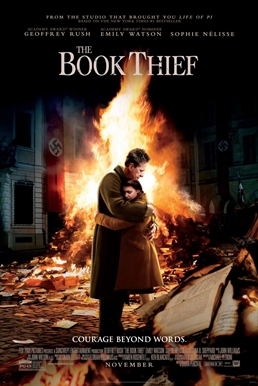 I recently read Marcus Zusak's The Book Thief, an absorbing story about a young girl in Germany on the brink of World War II. She is adopted by foster parents who teach her to read using books she steals in strange and often tragic situations. Narrated by Death, this is an initially odd and ultimately moving tale about a brave family that shelters a Jewish man and the various tragedies they experience alongside the small joys of their ordinary lives. The book is a sprawling 560 pages, but now it has been condensed into a two-hour movie. It's a serviceable effort, but fails to capture the much-needed nuance and delicacy of the novel.
I recently read Marcus Zusak's The Book Thief, an absorbing story about a young girl in Germany on the brink of World War II. She is adopted by foster parents who teach her to read using books she steals in strange and often tragic situations. Narrated by Death, this is an initially odd and ultimately moving tale about a brave family that shelters a Jewish man and the various tragedies they experience alongside the small joys of their ordinary lives. The book is a sprawling 560 pages, but now it has been condensed into a two-hour movie. It's a serviceable effort, but fails to capture the much-needed nuance and delicacy of the novel.
Sophie Nélisse puts in an astonishing performance as twelve-year old Liesel Meminger. Liesel is a mere child who has to grow up quickly as she learns of the horrors of Nazi Germany. Nélisse's face captures every shifting mood and emotion that the young girl experiences over the course of the film, tumbling from joy to despair with credible ease. Her foster father, the kind and charming house painter Hans Hubermann, who teaches Liesel to read every night, is played by an incredibly warm Geoffrey Rush. Emily Watson plays his wife Rosa, a foul-mouthed woman with a heart of pure gold. Oftentimes, the movie fails to do this character justice because all you get is her outer coarseness and not enough of her inner warmth.
Ben Schnetzer plays Max Vandenburg, a Jewish man whose father fought alongside Hans in World War I. When he arrives at the Hubermann's doorstep, they do not hesitate to give him shelter from the Nazis. Max and Liesel have a wonderful connection - he's stuck in the basement all day so he relies on Liesel's daily descriptions of the world outside. In return, he writes her short fables and stories to help with her reading. Of course, these relatively idyllic conditions cannot persist and the Hubermanns have to face a perilous reality as World War II gets into full swing.
The Book Thief features a great cast and wonderful production design. The only trouble is that the script cannot capture all the subtlety and complexity that makes this story so compelling. It feels a bit clinical, a little too neatly told, rather than the oftentimes messy and tangential narrative of the novel. It's the opposite problem of The Secret Life of Walter Mitty, where the writer had expanded a short story to a long movie. Here the screenwriter, Michael Petroni, has turned a long book into a short movie, and it doesn't entirely work. This is by no means a bad movie, but it isn't a great one. If you refuse to read the book, you could perhaps get away with watching the movie, but you would be missing out on a truly engrossing tale.
No comments:
Post a Comment